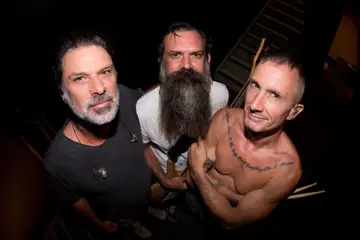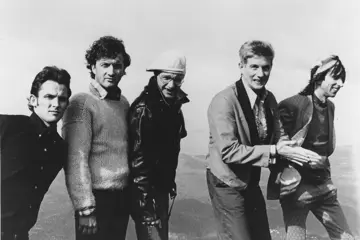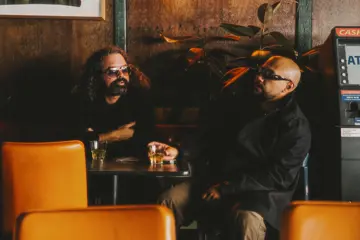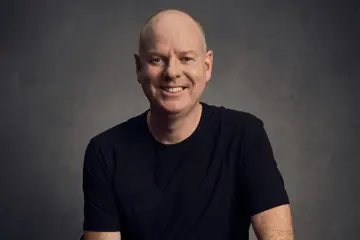The Sydney Film Festival opens this week, bringing with it a shit-ton of new films, and, if you care about such, Martin Scorsese’s old back-catalogue hits. In preparation for the dawning of SFF, your old homie Film Carew has been watching as many things as humanly possible, all so as to assemble this handy guide:
ANGRY INDIAN GODDESSES
For a stint, Pan Nalin’s “Indian Bridesmaids” lives up to its advanced billing. A crew of friends — each, in their own lives, standing in defiance of male harassment — gather in Goa for a wedding, a lively portrait of female bonding and low-wattage feminism brewing. But, then, its final act submits to wild, hysterical melodramatics straight outta some cut-rate soap-opera, culminating with a Spartacus-styled rousing finale that can only provoke involuntary eye-rolling.
BARAKAH MEETS BARAKAH

Just when you think the boy-meets-girl clichés of the rom-com have nothing left to give, Barakah Meets Barakah tells a boy-meets-girl tale set in Jeddah. Mahmoud Sabbagh’s debut film provides a window into life on the ground in the Saudi state, presenting a pair of relatable characters (and a host of wacky caricatures around them) whose interest in each other is thwarted at every turn by a society cold to individual desires. Using the universal currency of love — and a camera attuned to the architecture of the city — Sabbagh shows the difficulties of navigating a climate in which both public space and private emotions are stringently policed.
CHEVALIER

Athina Rachel Tsangari’s follow-up to 2011’s bonkers Attenberg is a Greek Weird Wave classic. It finds a host of middle-aged men on a yacht moored in the Mediterranean, that enter into an Alpha Male contest, measuring penis size, baldness, and cholesterol levels. As the men compete in increasingly ridiculous feats and stunts, fuelled by petty competitiveness and idiotic stubbornness, all the deadpan drollery can’t disguise the scalpel-sharp satire; Chevalier puncturing the inflated male ego, authoring a savage portrait of vanity, insecurity, and patriarchy.
CHILDHOOD OF A LEADER

Don't miss a beat with our FREE daily newsletter
Childhood Of A Leader opens with an announced ‘Overture’, in which a breathless montage of WWI imagery barrels along under a discordant, dizzying, Herrmann-esque score by none other than Scott fucking Walker. What follows is a stark parlour drama about a petulant only-child twerp who — because of, I guess, his overbearing mother, Bérénice Bejo — will grow up to become a fascist despot; its dour, shadowy minimalism steeped in Michael Haneke’s The White Balloon. It’s an unexpected directorial debut from expat American actor Brady Corbet; weighty, imposing, and brilliantly framed. And, gladly, it ends with an epilogue in which Walker’s score again gets thunderous and unnerving, Corbet’s camera turns vertiginous circles, and the kid has now become the human embodiment of pure evil: Robert Pattinson.
CLOSET MONSTER

There’s lots of queer-kid coming-of-age clichés in Stephen Dunn’s directorial debut, but there’s also a talking hamster voiced by Isabella Rossellini and a cold-wave score from Maya Postepski of Austra, there to elevate it, just, above the generic.
DEATH IN SARAJEVO

The interrelated-web-of-characters movie became one of the most detestable cinematic sub-genres some time around the Haggis Crash, but Danis Tanović makes an invigorating case for rehabilitating the approach. Set at the nearest Sarajevo hotel to the site of Franz Ferdinand’s assassination, on its 100-year anniversary, the people at the hotel range from a French actor delivering a speech and a documentary crew interviewing subjects on the significance of the site (and effectively explaining the history of Bosnia in soundbite form), and, then, to the hotel whole hotel staff, with familiar upstairs/downstairs divides.
DEMOLITION

After the luminous Wild, it was imagined that Jean-Marc Vallée’s Demolition — which opened Toronto last year — would be an Oscar contender; with Jake Gyllenhaal playing a high-finance dickwad who calls his life into question after the death of his wife in a (side-on-collision-that-you-don’t-see-coming cliché) car accident. Only thing is: both Bryan Sipe’s script and Gyllenhaal’s performance are all kinds of odd. Quirky, even. Forget the sledgehammer subtlety in its main-story symbolism — Gyllenhaal starts taking apart everything around him, from appliances to houses — there’s a scene in which our lead anti-hero gets a 12-year-old to shoot him whilst he wears a bullet-proof vest, and it’s played for zany-hijink laughs.
DESTINATION ARNOLD

Sascha Ettinger Epstein’s slight — 72 minutes — documentary is blessed with a pair of charismatic, candid subjects: two Aboriginal amateur body-builders who struggle with staying on-diet and gym-devoted. But, problematically, most of the story’s most telling, most dramatic moments happen off camera; there the sense that Epstein, too, is struggling to achieve her lofty goals in a part-time scenario.
EUROPE, SHE LOVES

A quartet of broke young couples —in Thessaloniki, Tallinn, Seville, and Dublin— talk, fight, and fuck; this observationist documentary making their quotidian domestic dramas a microcosm for the financial and social struggles of the EU itself.
EVOLUTION

In a stylised cinematic enclave of mothers in tight ponytails and sons in grey outfits, a remote rocky island’s boys are bred until, on the brink of adolescence, they’re sent off to a shadowy hospital, where sinister purposes and Cronenbergian body-horror await. Just as she did with her luminous 2004 debut, Innocence, Lucile Hadžihalilović fashions a masterpiece of beautiful imagery and sustained eeriness, its opaque parable told in glorious pure cinema. With two near-perfect films to her credit, there’s now plentiful evidence Hadžihalilović is one of the world’s most singular auteurs; hopefully she’ll be allowed to make her next film sooner than in another decade.
A FISH

Pleasingly oddball Korean film in which a noir-movie gambit — a private detective and a husband go off on a roadtrip in searching of his missing wife — turns, increasingly, towards the surreal; shamanist rituals turning things increasingly surreal and strange.
FUKUSHIMA, MON AMOUR

Set in the most ghost-towny stretches of radiation-blasted Fukushima, Dorris Dörrie’s film is shot in stark black-and-white, and is about grieving, healing, rebuilding a life. That sounds weighty, but, instead, this two-hander — in which a German clown(!) and an elderly geisha camp out in the ruins of an old house — is light as a feather; a backhanded compliment that gets at both its strengths and weaknesses.
GIRL ASLEEP

This sweet, silly Australian teen-movie begins as ultra-twee Wes Anderson homage — all symmetrical framing, mannered delivery, and cutesy costumes — before getting stranger as it goes: debutante director Rosemary Myers delivering choreographed dance-numbers, schoolyard bullying in song, and, eventually, a full descent into a fairytale dreamworld.
HEART OF A DOG

Laurie Anderson’s first film in three decades is an essay movie dedicated to her late husband, Lou Reed, but mounting a long cinematic devotional to her late rat terrier, Lolabelle. A dreamy, scattershot monologue on life, death, love, creativity, Buddhism, and the canine mind, it plays like a relaxation-video shot through with oddball anxiety and existential questioning; the resulting film at once all-too-cute and profoundly-deep.
HIGH-RISE

High-Rise seems like the film in which cult English genre-auteur Ben Wheatley shall achieve crossover, adapting J.G. Ballard’s famous dystopian-sci-fi parable with an upwardly-mobile budget and a top-shelf — Tom Hiddleston! Luke Evans! Sienna Miller! Elisabeth Moss! Scenery-chewing Jeremy Irons! — cast. And, true, there’s an accessibility in the lurid ’70s wardrobe and the literalness of its lower-class/upper-class parable. But, the film is also insanely over-the-top and bugfuck bonkers, descending into a sustained mania of decadent debauchery and theatrical depravity.
IN JACKSON HEIGHTS

Indefatigable direct-cinema don Frederick Wiseman just keeps on keeping on. In the half-century since his revolutionary debut, 1967’s Titicut Follies, he’s now made 46 feature films; patiently, tirelessly chronicling the inner workings of social institutions. Here, he turns his calm camera on the teemingly-multicultural titular Queens neighbourhood; looking at impassioned discussions on the most grass-roots of political levels. Given Wiseman’s ways, it’s no surprise that the film rolls for over three hours; achieving its weight by slowly gathering details, and depth, as it goes.
JANIS: LITTLE GIRL BLUE

Janis Joplin, rock’n’roll saint and founding 27-Club member, gets the talking-heads-and-Woodstock-archives rockumentary treatment in this perfectly-fine film from the usually-more-provocative Amy Berg. It succeeds in the standard rock-doc tasks — humanising its subject and showing the personal travails behind the music — but never really rises above the genre.
JHERONIMUS BOSCH: TOUCHED BY THE DEVIL

With the 500th anniversary of the legendary Dutch painter in the air, Pieter van Huystee goes behind the scenes of Bosch scholars, enthusiasts, and preservationists. The film is at once a portrait of pedagogy, gallery rivalry, and the recent developments in canvas-x-raying ‘artistic archaeology’.
KATE PLAYS CHRISTINE

Following up his stylised docudrama Actress — a study of the psychological baggage of an actor whose career is on the slide — Robert Greene circles similar thematic terrain with Kate Plays Christine. Instead of a straight biopic telling of the life of Christine Chubbuck (the Florida reporter who killed herself live on TV, and who also inspired Antonio Campos’s new Christine), instead Greene watches mumblecore it-girl Kate Lyn Sheil preparing to play her in this film, as it goes. It’s, again, a film about an actress’s frustrations; Sheil grappling with the elusiveness of her unknown, long-gone subject, her role as if trying to grasp onto a phantom.
LAMPEDUSA IN WINTER

A 3km-wide speak in the Mediterranean, Lampedusa is a remote island that has found fame — or infamy — in recent days as immigrations hot-spot; marking the gateway to Europe for asylum-seekers fleeing conflicts in Africa and the Middle East by boat. Jakob Brossman’s observationist doc looks at life on-the-ground for the permanent inhabitants of Lampedusa; where the demise of the fishing industry and the rise of refugees have created a real friction. And, their local pushback stands as symbolic of the European treatment of immigrants; Lampedusa In Winter a smart, calm cinematic study in one of the planet’s most pressing political issues.
LET THEM COME

Salem Brahimi’s film is dedicated “to the 200,000 victims of the dark decade in Algeria”, detailing the oft-civilian victims of the Algerian ‘dirty war’ of the ’90s, when Islamic insurgents sought to overthrow the government. Here, a French expat and his Arabic wife are caught in the currents of history, buffeted by forces beyond their control; their attempts to create a family, and stability, futile attempts to fight a rising tide of fundamentalism, and the film’s inevitable sense of dread.
MISS IMPOSSIBLE

Lively coming-of-age comedy about a snarling, rebellious 13-year-old girl forced to repeat the 7th grade. Eventually, she finds outlets for her rage in a charming French teacher, weighing up the potential of various older boys, and fronting a budding rockband.
MORRIS FROM AMERICA

Likeable, lightweight coming-of-age movie about an awkward African-American kid who’s just arrived in Germany to live with his single dad (Craig Robinson), that indulges in clichés — the villainous rich German jerks who bully him are out of an ’80s T&A teen-movie — but isn’t beholden to them.
MUSTANG

In a remote seaside village in Turkey, five sisters dare cool off in the ocean on the last day of school. The sight of schoolgirls in wet uniforms sends the local yokels into a moral panic, so their ultra-orthodox uncle (Ayberk Pekcan of Winter’s Sleep) locks them up in their family villa, gets their hymens inspected, then starts marrying them off. Comedy, tragedy, and eventually inspirational “jailbreak” escape ensue, debutante director Deniz Gamze Ergüven turning its portrait of patriarchal oppression into Oscar-endorsed feelgoodism.
NO HOME MOVIE

Those still mourning the recent death of legendary cinematic iconoclast Chantal Akerman will be both heartened and heartbroken by her final film. Here, through her signature long takes — from trees blowing in the breeze to kitchen-table conversations — she watches her frail mother inch slowly towards death, finding profundity through banality, and coming face-to-face with mortality. It’s a very personal, painful film; a sad, beautiful culmination to a provocative, profound career. In celebration of such, SFF is also showing Akerman’s 1975 masterwork, Jeanne Dielman, 23 Quai Du Commerce, 1080 Bruxelles, a fictional depiction of a housewife’s horrifying tedium whose Ozu-indebted, unbroken long takes build one of cinema’s great stylised prisons.
ON RICHARD’S SIDE

“People want disability to be inspiring,” says the aging, exhausted mother at the centre of Andrew Wiseman’s intimate documentary; the Richard of its title being a now-30-something disabled son who’s required 24-hour care for his entire life. Wiseman, at times, submits to this desire to tend toward the Inspirational, matching a movie’s love and human empathy with tinkly, heartstring-plucking piano music and emotional manipulation. The documentary finds its greatest profundity in the simple fact that Wiseman first pointed a camera at his subjects in 1989, the most resonant moments coming when footage from the distant past and the painful present intersect.
OYSTER FACTORY

Billed, simply, as ‘Observational Film #6 by Kazuhiro Soda’, the classic direct-cinema doc calmly observes the quotidian toil at its titular locale. At first, the lapping of the waves, the clattering of the machines, and the repetitive tasks give it almost a lulling quality; but, slowly, the film reveals itself to be about the power-relationship between Japanese bosses and itinerate Chinese workers, suggesting dark thematic currents beneath its serene surface.
SING STREET

Whilst it doesn’t measure up to recent screened-at-SFF kids-form-a-band larks We Are The Best! and God Help The Girl, the latest musically-themed film from John Carney (Once, the Knightboat-starring Begin Again) is a kids-form-a-band lark tinged with memoir. It’s set in mid-’80s Dublin, which means that its endless rollcall of era pop hits and familiar feelgood machinations are shot through with social resonance; the film, as much as anything, about using music to rise above institutional abuse.
SONITA

15-year-old Sonita is a displaced Afghan immigrant in a Tehran school for girls, who spends her days in her dorm, practicing her rhymes, dreaming of being a rapper. Standing in the way of her dreams: women are forbidden from publicly performing music in Iran, and she’s about to be sold into marriage back in Afghanistan. At this point, director Rokhsareh Ghaem Maghami enters the frame; not merely wrestling with the objectivity of the documentarian, but her supposed status as mere observer. Becoming an active participant in the life of the subject, Maghami shapes both documentary and life simultaneously; making Sonita a feelgood shrine to interventionist advocacy.
SUNTAN

When a doughy, depressed doctor (Makis Papadimitriou) on a remote Greek isle treats the wounds of a young, hot girl, he’s drawn into the Dionysian spirit of revelry that reigns over the island throughout the summer. Soon, his microwave-meal-for-one, sad-and-lonely existence is a non-stop parade of partying; his eagerness to dance the night away motivated by a dark, never-revealed past. But, sure as his pale, paunchy, hairy form contrasts with the lithe, tanned flesh around him, he’s in over his head; Suntan soon becoming a disturbing study in desperate-neediness turned delusional obsession.
TEENAGE KICKS

This impossibly-earnest, utterly-humourless coming-of-age saga harkens back to the teen-angst films of the ’90s, essentially playing as a kind of B-grade Head On. Here, a troubled Sydney youth, wracked with grief and rebelling against his migrant family, proceeds to fuck everyone in sight: cruisers in the woods, sex-cam dudes, those who’ll give him drugs, his best friend, his best friend’s girlfriend, the girlfriend of his dead brother. In print, that probably sounds salacious, but in reality there’s few thrills, in either script or performance.
THE TREASURE

Corneliu Porumboiu uses seemingly mundane dramatic devices — an episode of a low-budget TV talk show (12:08 East of Bucharest), a film-set (When Nights Falls On Bucharest, Or Metabolism), an old VHS tape of a soccer match (The Second Game) — to make fabulously political films. His latest, most accomplished, and most audience-friendly film, The Treasure, is a veritable fable, in which a pair of down-and-out neighbours attempt to locate buried treasure; the air, once again, thick with deadpan humour. But the notion of concealed riches is hugely symbolic in Romania, the spectre of Ceausescu lingering over the entire lark.
UNDER THE SUN

Under The Sun opens with a title card dripping with irony; chronicling how this documentary was made with the cooperation of North Korean officials. They “kindly provided us with an around-the-clock escort service, chose our filming locations and looked over all the footage we shot”. But, with its air of stage-managed reality, Vitaly Mansky’s documentary actually does convey a sense of life in the DPRK; the state-sanctioned delusions and collective quotidian pantomime of lives lived in a grand-scale cult of personality.
WAR ON EVERYONE
Crooked cops are so often presented as cinema’s ultimate villains, but, here, Michael Peña (riding high after his scene-stealing Ant-Man turn) and Alexander Skarsgård (handsome) play a pair of lovable-rogue detectives, on-the-take and quick to quip. Irish smart-ass John Michael McDonagh makes his American debut with a cracking pace, constantly-funny script, and all kinds of homage to Blaxploitation flicks; and his assembled cast — Tessa Thompson, Malcolm Barrett (Dear White People reunion!), Paul Reiser, David Wilmot, Stephanie Sigman, a channelling-Crispin-Glover Caleb Landry Jones — delight in the dialogue.
WEINER

You’ve surely heard the jokes about Anthony Weiner, the unfortunately-named New York politician who became infamous — and late-night-talk-show monologue fodder — when his sexting exploits were brought to public light. But Josh Kriegman and Elyse Steinberg’s documentary, Weiner, isn’t, merely, some from-a-distance rehash of salacious scandal. Instead, it’s an on-the-ground, all-access portrait of Weiner running for Mayor of NYC, that gets all-the-more astonishing when he’s engulfed in controversy all over again, and you get real-time, behind-closed-doors reactions in the moment shit hits fan.















